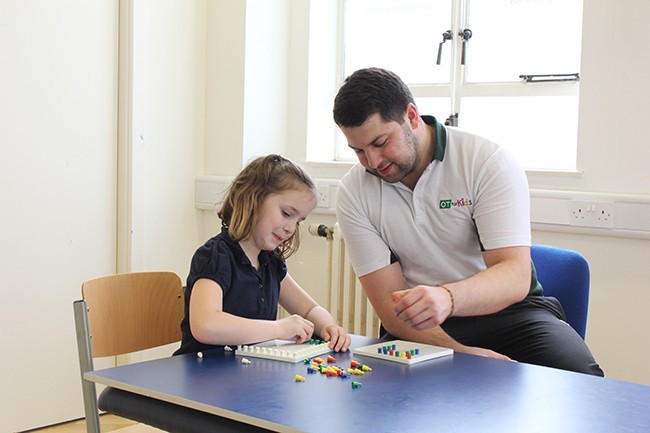Fine Motor Difficulties
Fine motor skills is a term used by therapists to describe the intricate and detailed movements of the hand needed to manipulate, control and use objects, produce legible, neat handwriting and dress themselves independently. A child with poor fine motor skills will often be the slowest to get changed, need the most help at school in regards to handwriting and cutting and find everyday tasks hard, or take longer than expected to complete tasks involving small movements.
An occupational therapist would be able to identify exactly which component of fine motor skills your child is most struggling with and provide effective treatment aimed at improving fine motor skills and therefore increased function in relation to a range of activities.
Some examples of how fine motor skills can affect a child's life at home and in school are:
- Difficulty tying shoelaces
- Unable to do up buttons/zips
- Scribbly drawing
- Poor handwriting
- Takes a long time to pick up small objects
- Cannot/finds it very hard too manipulate objects in hand
- Difficulty using both hands at the same time
- Difficulty cutting
- Messy work
Conditions that tend to produce symptoms that would influence the skills needed to complete fine motor movements are:
- Acquired brain injury
- Cerebral Palsy
- Developmental Co-ordination Disorder
- Developmental Delay
- Down's Syndrome
- Hydrocephalus (child)
- Multiple Sclerosis
- Muscular Dystrophy
- Rett Syndrome
- Sensory Processing Disorder
- Stroke
- Spina Bifida
How can Occupational Therapy help?
Occupational therapy is a profession in which the therapist uses activities to promote the skills needed to function in everyday activities. One area which we work in is paediatrics, analysing and improving many aspects needed for a productive childhood, such as movement, concentration attention, confidence and fine motor skills. Through using activities to promote skills, the therapist can maintain the necessary motivation or engagement needed from the child in order to develop skills, for with a lack of motivation and subsequently focus to engage in therapy, research has shown that improvements will not be made as quickly. By linking the underlying components of fine motor skills to activities that children complete daily (in school and at home) such as cutting, writing, drawing, painting, dressing and playing board games, fine motor skills will subsequently be improved.
If you think that your child is having difficulty with their fine motor skills, which is often evident through being unable to tie shoelaces, do and undo buttons and poor handwriting, then an occupational therapist will be able to help. Please email office@otforkids.co.uk or call 0330 223 0888 to arrange an assessment or to talk to one of our therapists.

 Next steps:
Next steps:Please contact one of our experienced occupational therapists today and we will gladly discuss how we can help and what services we can offer you.
- 0330 223 0888
- office@otforkids.co.uk
- 2 Hagley Rd, Salford M5 3EY [map]







 OT for Kids have been a great help in aiding my son Jake with coping with his dyspraxia both at home and in school. They came out to our house and completed the assessment at home.
OT for Kids have been a great help in aiding my son Jake with coping with his dyspraxia both at home and in school. They came out to our house and completed the assessment at home.






